The Social Leapfrog Program is an innovative initiative designed for social organizations that are or aspire to become hybrid—entities with a defined social mission that also generate revenue through the sale of products and services. The program focuses on enhancing management and business skills while fostering a reflective and educational environment aimed at knowledge transfer and capacity building over the course of three years. Supported by the extensive Nova School of Business and Economics community, including students, alumni, faculty, staff and partners, the program offers a diverse array of activities. These include traditional educational formats such as master courses and executive education programs, as well as mentoring and coaching opportunities. Participants can engage in projects with students, including master theses, student club activities, and pro bono internships, alongside workshops led by the school's faculty. The ultimate goal of the program is to make these organizations “leapfrog” in terms of impact and financial sustainability. By enhancing their ability to reach more beneficiaries and improve current services, the program aims to significantly boost the effectiveness and self-sustainability of participating organizations. Aligned with School's vision as "a community dedicated to developing talent and knowledge with a positive impact on the world," the Social Leapfrog Program also aspires to inspire the school's students, the future leaders. Students who participate in the program are better equipped with a greater awareness of social issues and prepared to promote significant changes in society.

3rd PLACE
Community Engagement Initiative of the Year Award
Social Leapfrog Program
3rd PLACE Community Engagement Initiative of the Year Award
Nova School of Business and Economics - Portugal
"Social Leapfrog Program: Empowering the Social Sector, Inspiring Future Leaders"
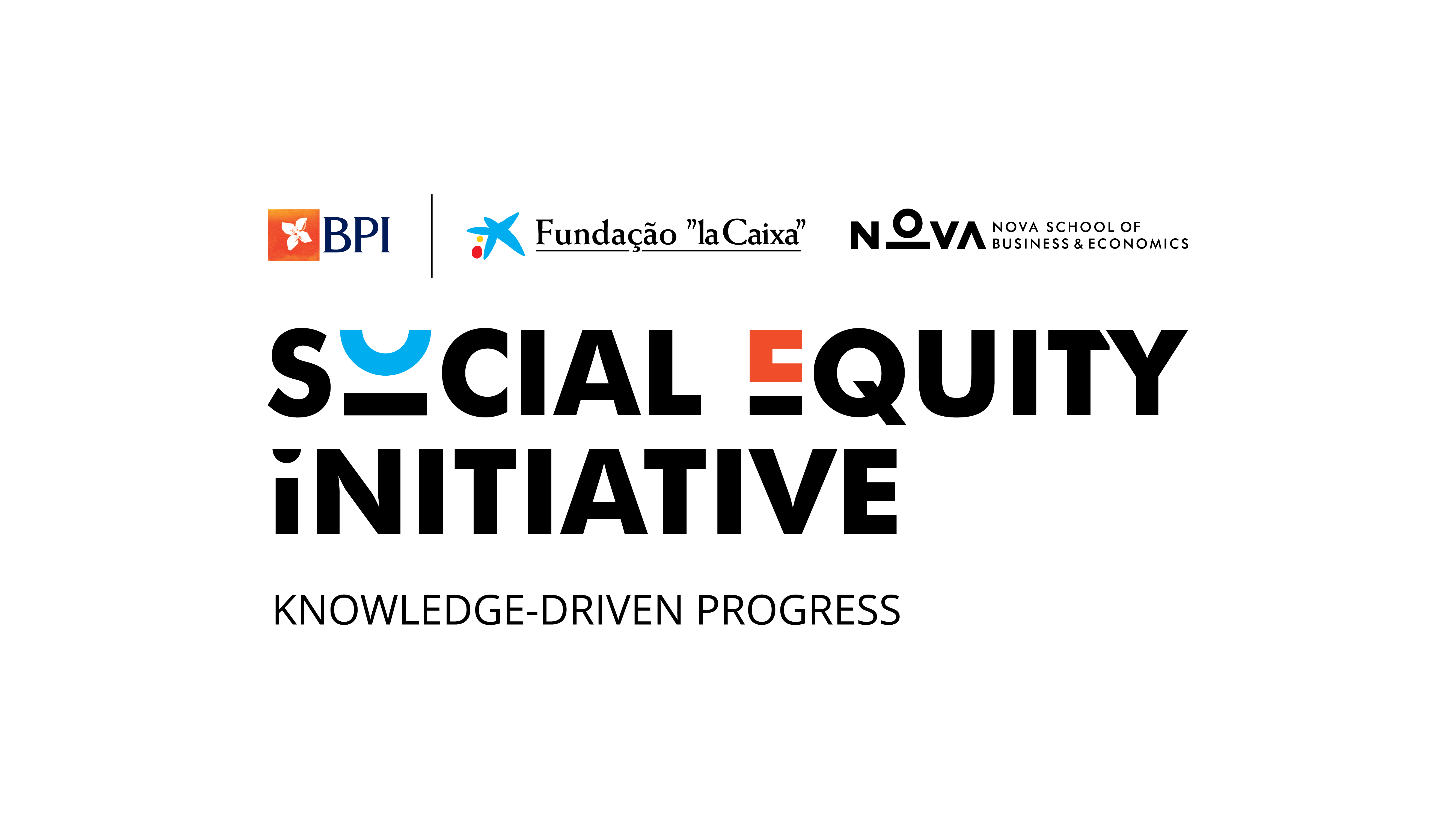
Engage on social media
(Nova SBE Leadership for Impact Knowledge Center Linkedin)
(Social Leapfrog Program YouTube Playlist)
Summary
Key People
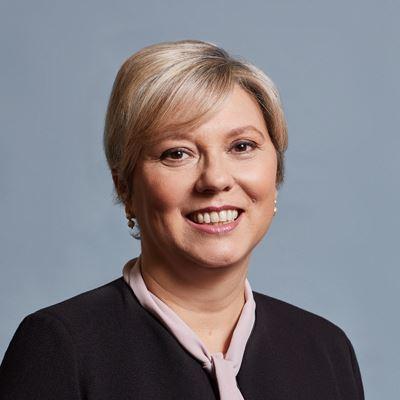
Carmen Lages
Social Leapfrog Academic Director/ Associate Professor of Marketing
Nova SBE Leadership for Impact Knowledge Center,
Nova School of Business and Economics
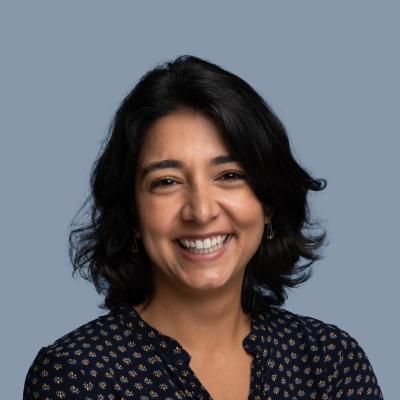
Talita Feliciano
Social Leapfrog Program Coordinator
Nova SBE Leadership for Impact Knowledge Center,
Nova School of Business and Economics
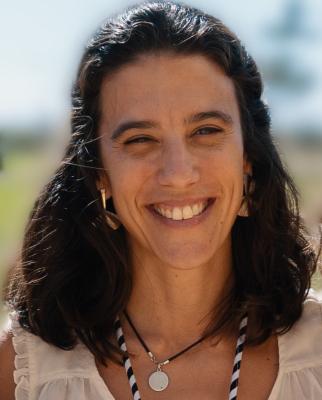
Carlota Montenegro
Social Leapfrog Program Manager
Nova SBE Leadership for Impact Knowledge Center,
Nova School of Business and Economics
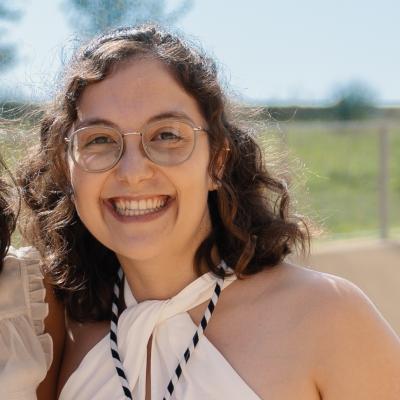
Sofia Magalhães
Social Leapfrog Program Manager
Nova SBE Leadership for Impact Knowledge Center,
Nova School of Business and Economics
Acknowledgements
The program would not have been possible without the trust of our partners, "la Caixa" Foundation and BPI, who had the vision to take a risk and invest in academia as an agent of transformation for the social economy. It is also important to highlight that Nova SBE is an innovative university with a strong focus on impact and society, which makes a significant difference in the final outcome of a partnership like this, the Social Equity Initiative. This initiative aims to promote the social sector in Portugal in the long run, sketching a portrait of the sector and developing research and empowerment programs to support Portuguese social organizations. In total, the initiative involves eight projects and two Chairs.
We must also express our gratitude to our partners Vieira de Almeida (legal diagnosis) and KPMG (fiscal and accounting diagnosis) for their contributions to the initial diagnosis development. This decisive phase of the program determines whether the organization progresses to the experience phase.
Images
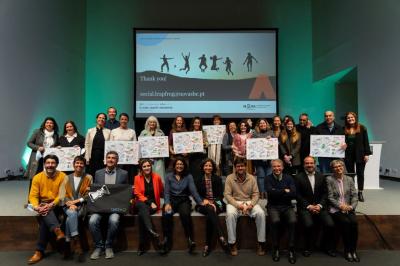
Graduation of the first edition in 2022
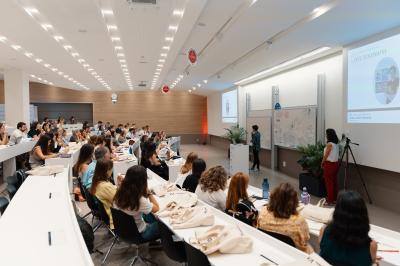
Kick-off of the 4th edition in 2023
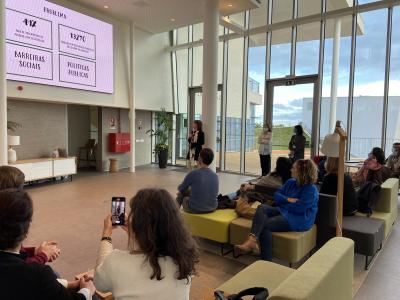
Frog Tank of the 1st edition in 2022
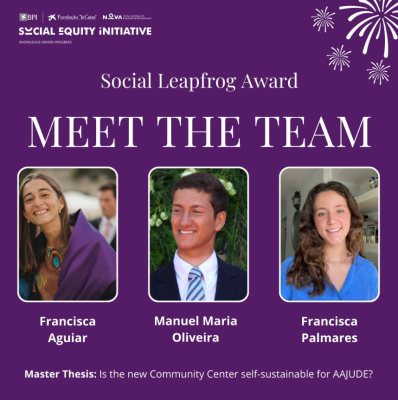
Social Leapfrog Award year 2023/2024 (Best Social Leapfrog Master Thesis)
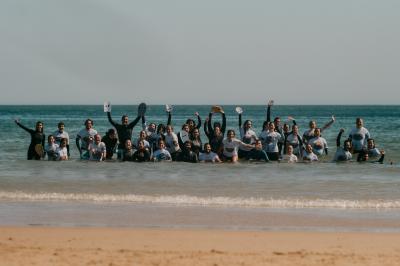
Annual Meeting 2024 - Surfers with Impact
IMPACT STORY
Impacting lifes
There are numerous success stories that have generated impact among different stakeholders, and we can confirm this through our impact measurement. For the organizations, the best part of the program, beyond all the learning, tools, strategy, marketing, and other aspects, is the community formed—a network with different expertise that promotes mutual support.
"The participation of VilacomVida in the program came at a decisive moment for us, when we had just signed the representation of the Café Joyeux in Portugal, with all the responsibility that such an achievement would imply for the team. Today we are aware of the impact that those three most important years of our journey had, accompanied by an excellent team focused on helping us make this path sustainable, organizing processes, motivating teams, creating tools, and applying best practices that the business and academic sectors can bring to the social sector and especially to the market in which we operate."
From the students' perspective, it is a great opportunity to apply what they learned during the course and contribute to society: "Working with a social organization like CRESCER changed my NOVA SBE student experience by integrating my theoretical knowledge into a practical context. My motivation in integrating this project was to have a real impact and the satisfaction of being able to support a meaningful purpose. I developed my social skills in an understanding and friendly environment. It is highly rewarding to know that a collective commitment and effort permitted to contribute to the vulnerable population's well-being, integration, and independence enhancement. I really enjoyed this experience”.
LEARNINGS
Lessons learned
One of the most significant insights from our journey has been the powerful synergy created by the triad of academia, the corporate sector, and the social sector. This combination offers a perfect blend of scientific research, learning models, real-world applicability, and value propositions. It was surprising and enriching to see how each participant in the program, whether students, corporate professionals, or members of social organizations, embarked on a unique journey of mutual teaching and learning.
Another critical success factor is the dedicated team behind the program. They manage the entire process with remarkable sensitivity, understanding the nuanced needs of each organization, welcoming students and professors, and identifying the perfect matches for mentoring. Their ability to read between the lines and grasp each organization's specific moments is invaluable. Empathy is at the heart of managing such a program, as it fundamentally involves people working together for people.
For those looking to follow a similar path, here is some advice:
1. Embrace Collaboration: Engage with academia, corporate entities, and social sectors to enhance learning and bring diverse perspectives.
2. Value Empathy: Understand the needs, challenges, and aspirations of those you work with to build stronger, more effective teams and relationships.
3. Be Open to Learning and Teaching: Approach each interaction as an opportunity for mutual growth.
4. Seek the Right Team: Surround yourself with a team that is skilled and sensitive to the unique dynamics of the project.
5. Focus on Real-World Applications: Ensure that the knowledge and skills gained are applicable in real-world contexts.
FUTURE PLANS
What's coming?
The methodology created for the program was designed to be replicable by any business school in any geographic region, as it takes into account the local culture, the maturity of organizations, the expertise of university professionals, and is fully adaptable and customizable. We are currently in contact with several universities to replicate the program in different countries, including Canada, the UK, and Lebanon.
In addition to breaking boundaries, the program is seeking funding to develop a website that includes various management tools and a tutorial on how to apply them. This will democratize information and ensure that everyone has access. The goal is for any social organization and/or social entrepreneur to have access to the main tools to best manage their organization or company.

